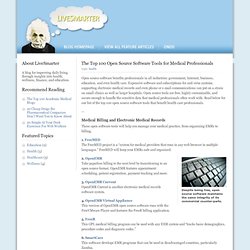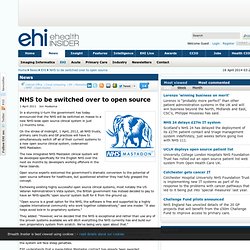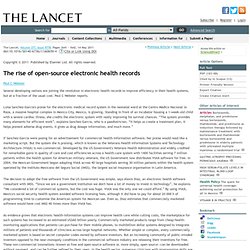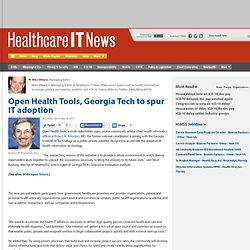

Online Nursing Degree Directory » Blog Archive » The Top 100 Open Source Software Tools for Medical Professionals. Open source software benefits professionals in all industries: government, Internet, business, education, and even health care.

Expensive software and subscriptions for anti virus systems, supporting electronic medical records and even phone or e-mail communications can put on a strain on small clinics as well as larger hospitals. Open source tools are free, highly customizable, and secure enough to handle the sensitive data that medical professionals often work with. Read below for our list of the top 100 open source software tools that benefit health care professionals. Medical Billing and Electronic Medical Records These open software tools will help you manage your medical practice, from organizing EMRs to billing. 1. Despite being free, open source software maintains the same integrity of its commercial counter-parts. 2. 3. 4. 5. 6. 7. 8. 9. 10. Antivirus, Security and Privacy 11. 12. 13. 14. 15. 16.
Communications. eHos codeforge - supported by Tactix4 > Projects > CURIO > Home. Campaign for NHS VistA. Crowdsourcing Landscape. NHS to be switched over to open source. 1 April 2011 Jon Hoeksma In a stunning U-turn the government has today announced that the NHS will be switched en masse to a new NHS-wide open source clinical system in just 12-months time.

On the stroke of midnight, 1 April, 2012, all NHS trusts, primary care trusts and GP practices will have to simultaneously switch off all of their current systems to a new open source clinical system, codenamed NHS Mastadon. The new integrated NHS Mastadon clinical system will be developed specifically for the English NHS over the next six months by developers working offshore in the Faroe Islands. Open source experts welcomed the government's dramatic conversion to the potential of open source software for healthcare, but questioned whether they had fully grasped the concept. “Open source is a great option for the NHS, the software is free and supported by a highly capable international community who work together collaboratively,” said one insider. The rise of open-source EHRs. Several developing nations are joining the revolution in electronic health records to improve efficiency in their health systems, but at a fraction of the usual cost.

Paul C Webster reports. Luisa Sanchez-Garcia's praise for the electronic medical record system in the neonatal ward at the Centro Médico Nacional la Raza, a massive hospital complex in Mexico City, Mexico, is glowing. Standing in front of an incubator housing a 1-week-old child with a severe cardiac illness, she credits the electronic system with vastly improving his survival chances. “The system provides many elements for efficient work”, explains Sanchez-Garcia, who is a paediatrician. “It helps us create a treatment plan, it helps prevent adverse drug events, it gives us drug dosage information, and much more.” If Sanchez-Garcia were posing for an advertisement for commercial health-information software, her praise would read like a marketing script. Home - eHealthOS. Ohloh, the open source network.
Open Health Tools, Georgia Tech to spur IT adoption. Open Health Tools, a multi-stakeholder open source community whose chief health informatics officer is Robert M.

Kolodner, MD, the former national coordinator, is joining with the Georgia Institute of Technology on a public-private initiative designed to accelerate the adoption of health information technology. “The overarching mission of this initiative is to provide a virtual environment in which diverse stakeholders work together to unleash the innovations necessary to bring the industry to its future state,” said Steve Rushing, director of Health@EI2, which is part of Georgia Tech’s Enterprise Innovation Institute. [See also: Wide open future.] The new pro will include participants from government, healthcare providers and provider organizations, patient and personal health advocacy organizations, open source and commercial vendors, public health organizations, academic and non-academic researchers, start-up companies and entrepreneurs.